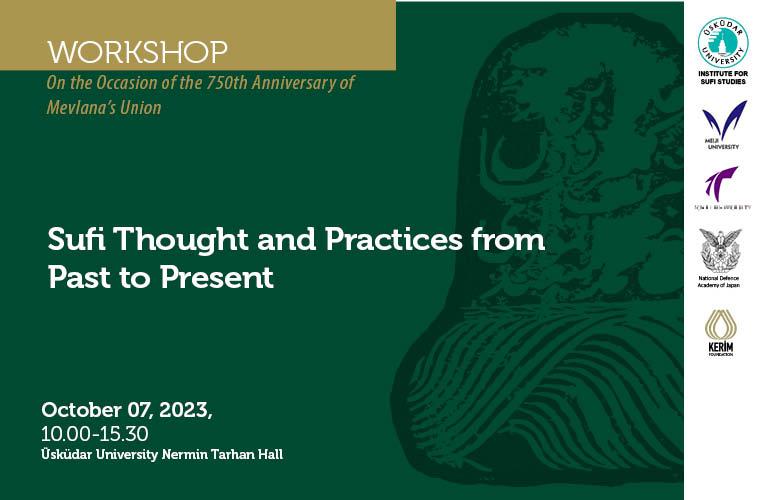
Sufi Thought and Practices from Past to Present Workshop
October 7, 2023 Saturday 10.00-15.30
Üsküdar University, Istanbul
Welcome Speeches
Session 1
“Principles of Sufi Thought in Ottoman Period”
Reşat Öngören
The Institute for Sufi Studies, Üsküdar University, İstanbul, Turkey
“Ibn 'Arabi: Formative Period in Sufism”
Makoto Sawai
Oyasato Institute for the Study of Religion, Tenri University, Nara Japan
Break
Session 2
“Rumi and Sultan Walad: Sufism in Medieval Period”
Kie Inoue
School of Arts and Letters, Meiji University, Tokyo, Japan
“Adam and Adamiyyet in the Divan of Niyâzî-i Mısrî (d. 1694)”
H. Dilek Güldütuna
The Institute for Sufi Studies, Üsküdar University, İstanbul, Turkey
Break
Session 3
“Why Do People Need Islamic Saints Today? In Case of Sudan”
Daisuke Maruyama
Department of Humanities, National Defense Academy, Japan
“Ramadan Practices from Civilizational Perspective”
F. Cangüzel Güner Zülfikar
The Institute for Sufi Studies, Üsküdar University, İstanbul, Turkey
Closing Session
Sufi Thought and Practices from Past to Present Workshop
October 7, 2023
Üsküdar University, Istanbul
Titles with Abstracts of Institute for Sufi Studies participants
Principles of Sufi Thought in Ottoman Period
Reşat Öngören
Abstract
It is known that the state of the Ottoman Empire had a close relationship with Sufis since its foundation. This relationship started with Shaykh Edebālī, who married his daughter off to the founder of the state, Osman Ghāzī, and deepened with the assignment of Dāvūd al-Kayserī, the prominent follower of the school of Muḥyī al-Dīn Ibn al-‘Arabī, as the head muderris during the formation of educational institutions, and with his oeuvre on Sufism, which includes his writings and translations during his fifteen-year tenure. These works helped to shape the view of tawhid/the thought of Being in the Ottoman Empire within the perspective of Ibn al-‘Arabī’s thought of wahdat al-wujud (Oneness of Being), and the thought of “divine love” within the framework of Ibn al-Fārīḍ's views, and furthermore, by means of the translation of Masnavī of Mawlānā Jalāl al-Dīn al-Rūmī, which took place about a century later, these two understandings were able to spread to wider circles. Thus, from the very beginning, the rulers, members of the ‘ulamā’ and the public were brought together within a high-level perception of Sufism shaped even before the Ottoman Empire. This environment caused some outstanding relations within the Palace-madrasa-lodge triangle, and as a natural consequence, works representing a holistic approach in which theology, jurisprudence and Sufism were handled together in the context of the relationship between sharī'a and tarīqa emerged. On the other hand, depending on the perception of jihad of Haji Bektāsh Velī, dervishes facilitated the realisation of conquests by participating in expeditions for jihad against the enemy while continuing jihad against their own nafs. Naturally, this approach led to a close contact between Sufis and the military.
Adam and Adamiyyet in the Divan of Niyâzî-i Mısrî (d. 1694)
Abstract
H. Dilek Güldütuna
In the Adam chapter, which is the first chapter of his famous work, Fusus al-Hikam, Ibn Arabi depicts the fundamental human qualities in the person of the first human and the first prophet Adam and describes in detail the human’s relation with the universe and God. This study will examine the Divan of Niyazi Mısrî, one of the most important representatives of the Akbari tradition, in the context of the chapter on Adam.
Ramadan Practices from Civilizational Perspective
F. Cangüzel Güner Zülfikar
Abstract
Regarding the human as the keystone forming civilization, Sâmiha Ayverdi operates in accordance with the hadith, “the one who sleeps when their neighbor lies hungry is not of us,” and particularly emphasizes the month of Ramadan. Demonstrating the importance of Ramadan for Ottoman-Turkish society, Ayverdi speaks about how the unity that is inherent to Islam manifests within the societal structure, particularly during Ramadan where there is an opportunity to overcome the separations of class, society, and economy. From Ayverdi’s perspective, the additional benefit to Ramadan is that it is also a time where not only the differences among the various parts of society are removed, but there is a cleansing ongoing within the individual human as well. Evaluating Ramadan as a time when the relation of the individual with another individual, with society, with the universe, and with God is gradually strengthened, Ayverdi gives examples from the various traditions that were prevalent at that time, and which are unfortunately close to forgotten now. As such, not only does Sâmiha Ayverdi depict and thus transmit the traditions of the past, she also provides the guide for how we can reach that level of awareness, solidarity, and community today.
